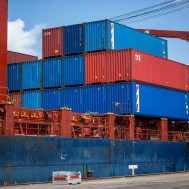Finding new ways to cut costs is always a priority for manufacturers and supply chain managers. However, cutting down in some areas of business can actually result in greater costs and loss of profits. Many supply chain managers choose to save money by contracting suppliers from low-cost countries. While this may seem beneficial upfront, low-cost labor does not save money in the long run.
Choosing to outsource in overseas markets inevitably racks up extra costs through longer production times, shipping far distances and problems that may occur along the way. Cost-driven negotiations can lead to the neglect of quality, which leads to bigger problems down the line as a large portion of the final cost of a product is directly impacted by quality. By pumping the brakes on overseas outsourcing, you can save money throughout the supply chain. Here’s how:
1. Reduce the risk of customer dissatisfaction
When outsourcing overseas, many supply chain managers often sacrifice quality for low prices. Low-quality products typically lead to extra costs in the long run. Malfunctioning parts may need to be replaced, returned or fixed, resulting in lost profits for manufacturers. Faulty products also delay operations, wasting manufacturers time and resources to build new parts. And finally, customer dissatisfaction can lead to warranty costs for products, extra delivery costs and even a loss of reputation and future business. All of these factors can heavily impact future profitability for the company.
2. Skip out on high tariffs
Companies sourcing through low-cost countries overseas may experience high tariff costs when importing the products to their home country. This can be easily avoided by sourcing locally, or at least within country borders. This will eliminate any costly tariffs you may run into, hold-ups at customs or expensive shipping costs with extended wait times. All of these extra costs eventually add up. Supply chain managers can avoid tariffs and other hold-ups by choosing a local secondary source to add to their supply chain.
3. Improve communication response times
Time is a valuable measure for manufacturers. Prolonged response times due to time zone differences can result in wasted time and resources. Using local sources gives manufacturers a better opportunity for quicker response to check inventory, address quality issues and check lead times for products. Many companies choosing to outsource are losing personnel because of constant travel and flying to vendors overseas to give quality audits or address issues. Local sourcing makes it easier on staff, eliminating long travel times and days away from their loved ones. Most local plants can be accessed with day travel instead of week travel time. This will also allow you to fully utilize your staff, giving them more time at home offices rather than spending long hours on planes or in airports.
4. Receive a fixed cost when sourcing locally
When sourcing locally with a company like Apple Rubber, you will always receive a fixed cost for products with no extra shipping expenses. This alone can save companies big money, as well as eliminate the chance for any surprises along the way. Supply chain managers looking to save money should consider sourcing locally to understand all of their prices up front and avoid any risks of extra costs through the production process.
5. In-house tooling can lead to big savings
Companies producing parts through outside sources often risk quality and extended lead times. Manufacturers with in-house tooling capabilities, like Apple Rubber, reduce common risks and can provide quality parts fast. Some of the major benefits of in-house tooling include reduced production costs, high-quality equipment, reliable products and shorter lead times. With in-house tooling, a company is able to plan ahead to what is needed for each product and plan accordingly to speed up production. It also allows companies to respond quickly to demands with machinery and products readily available. This will save supply chain managers time and extra costs associated with outsourcing.
While outsourcing with low-cost countries may appear to be saving money up front, the time, risks and potential extra costs that could accrue overtime can actually cause companies to lose money in the long run. Companies should consider adding trusted local sources to their supply chain. By sourcing with a company like Apple Rubber, companies can expect to know their costs, lead time and the quality products they will receive ahead of time.
Want to know more about secondary sourcing?
Tweet us @AppleRubber to continue the conversation.
